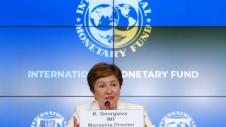The European Commission has revised its forecasts for the Greek economy downwards, envisaging a GDP growth of 3.5% in 2022 and 3.1% in 2023 (from 4.9% and 3.5% respectively in its winter forecasts made in February).
In a report on Greece, the Commission said that following a rapid recovery from the pandemic and a very promising start in the first months of the year, the Russian war of aggression against Ukraine has blurred the outlook for Greece. Economic growth is expected to slow but to remain stable, mainly due to the full recovery of tourism. It noted that high inflation was expected to burden households' real available income but government support measures were expected to partly compensate for this burden. The European Commission expects Greece to present a primary surplus in 2023.
The Commission report said that turmoil in global energy markets was expected to increase domestic inflationary pressure and to burden households' real available income, adding that increased risk adversion along with supply bottlenecks could delay the start of new investment plans, but the Greek economy was expected to benefit from the implementation of projects funded by the Recovery and Resilience Fund.
Exports were likely to continue growth, although at a slower pace compared with previous estimates because of an expected economic slowdown in the EU and the global economy. Real GDP is projected to grow by 3.5% in 2022 and by 3.1% in 2023, supported by a gradual recovery of real available income and an expected return of tourism to pre-pandemic levels.
The Greek economy will continue to create new jobs in 2022, despite a slowdown of economic activity, the Commission said, adding that a decision to raise the minimum wage by 7.5% in May, after a 2% increase in January could raise nominal wages in the second half of 2022 given the fact that almost one third of workers were paid with a minimum wage.
The Greek inflation rate is expected to reach 6.3% in 2022 and to fall to 1.9% in 2023, the Commission said. The general government deficit was 7.4% of GDP in 2021, reflecting increased pandemic relief support measures, but is expected to fall to 4.3% of GDP in 2022 and to 1% of GDP in 2023, allowing the government to present a primary surplus of 1.3% of GDP. The Greek public debt fell to 193% of GDP in 2021 and is expected to fall to 186% of GDP in 2022 and around 180% of GDP in 2023.
The European Commission's spring forecasts "confirmed the resilience and dynamism of the Greek economy and highlight the efficiency of the government's economic policy," Greek Finance Minister Christos Staikouras said on Monday, commenting on the release of the spring economic forecast report by the European Commission.
Staikouras said he was certain that despite the turmoil, the Greek economy could move towards an environment of high and sustainable growth, creating more new job positions and strengthening of social cohesion. He added that the Commission's forecasts showed that Greece was European champion in investments in the period 2021-2023, with double-digit growth rate for 2022, while unemployment continued falling.
The inflation rate is high but around the European average, with the Commission stressing that government support measures, a significant increase in minimum wage and higher deposits during the pandemic crisis eased inflationary pressures on households' available income.
The Greek Finance minister said that the new crisis did not seem to derail the economy and stressed that "with consistency, determination and confidence in our powers we continue the demanding but upward road we have drafted".








